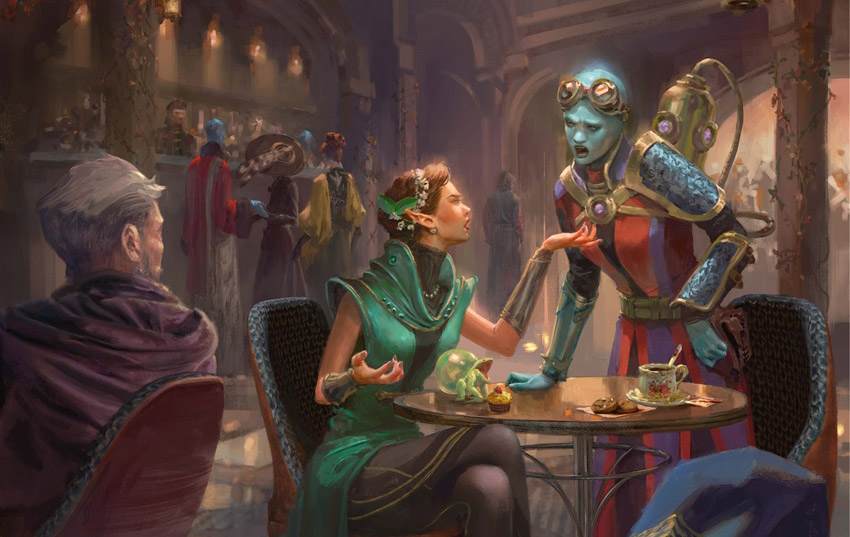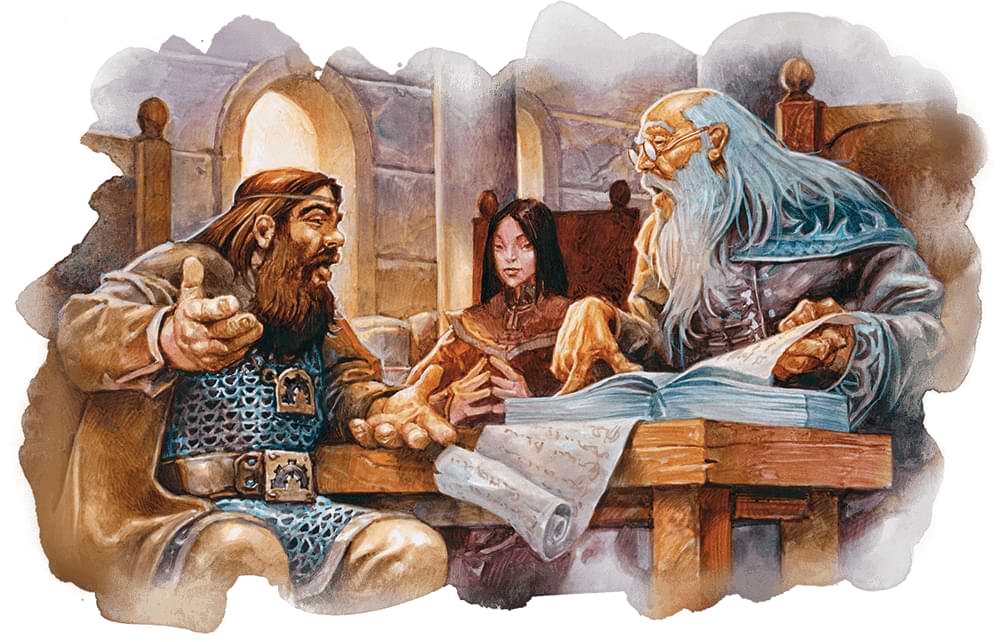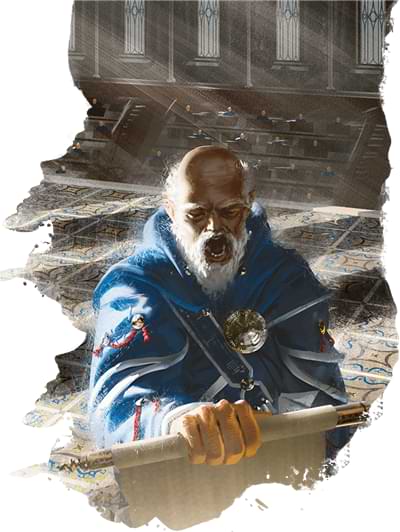The three pillars of adventure that make up Dungeons & Dragons—exploration, social interaction, and combat—all bring unique situations and mechanics to the table. However, based on the sheer number of character traits devoted to it, you could argue that combat is the most mechanically important pillar of the game.
But social encounters can have as much, if not more, impact on a campaign. These conversations range from everyday interactions to parlaying with demons and can be the difference between getting into a fight and recruiting a powerful ally. In this article, we'll discuss how to make social encounters more dynamic and engaging by employing various strategies to raise the stakes in them.
How Are Social Interactions Resolved?

While social interaction might be a core pillar of D&D, there aren't a whole lot of rules on how to run it. The Dungeon Master's Guide has a section under "Running the Game" titled Social Interaction, which contains mechanics Dungeon Masters can use when running social encounters. To summarize these rules, when running social situations, DMs first determine the starting attitude of the creature—friendly, indifferent, or hostile—to the party or character they are engaging. After that, there is a bit of roleplaying to determine which check the character will make. Finally, the DM calls for a check, which the player makes, and the result is compared to the tables provided under Conversation Reaction.
While this method is straightforward, it's far from dynamic. So, let's look at some mechanics we can add to spice up our social interactions.
Making Social Interactions More Dynamic
While everyday social interactions can follow the rules laid out in the Dungeon Master's Guide, pivotal moments in your campaign being resolved by a DC 12 Charisma (Persuasion) check can be anticlimactic for players and DMs. Below are several mechanics you can incorporate to vary the rules of social interaction in your game.

Skill Challenges
Skill challenges are a series of ability checks made in succession. The number of successes and failures are tracked during a skill challenge. When the predetermined number of successes or failures is reached, the skill challenge either succeeds or fails. This mechanic is a wonderful way to add tension to social situations as the results of the encounter slowly unfold before the players.
Example Skill Challenge
The party is trying to convince a shaman to grant them passage to the Feywild so they can pursue an evil being that has been harassing a nearby village. You set the skill challenge's success threshold at three successes before two failures and each check's base DC at 12.
The rogue wants to determine what the shaman's motives are. The DM asks them to make a DC 12 Wisdom (Insight) check. The rogue receives a 14, which counts as one success. Seeing as they succeeded, the rogue also learns that the shaman is concerned with the well-being of the nature spirits that inhabit their forest.
Then, the druid explains that their mission will return nature to balance. Seeing as they appealed to what concerns the shaman, the DC of the check is lowered to a 10. The DM asks the druid to make an Intelligence (Nature) check, in which they get a 15. That's two successes.
Finally, the bard tells a story of how their party saved the life of a forest spirit not too long ago. The DM asks the bard to make a DC 10 Charisma (Performance) check. The bard receives an 18, which is the third success. The party has succeeded in their skill challenge and will receive help from the shaman.
Skill Challenges Variation
Instead of basing the skill challenge's results off of successes and failures, you can use a "success threshold" to determine the level of success a party has. This is an excellent tool if there are different levels of success to achieve. Here's an example of how it works:
In the above situation, the success threshold is 10 for a minor success, 15 for a moderate success, and 18 for a major success. There will be at most three checks made during the skill challenge. The DC for each check is 12. After the character interacts with the shaman, they make an ability check determined by the DM. If the character beats the DC, they total however much they pass the check by and compare it to the success threshold. If the party manages to meet a success threshold before the end of the encounter, they receive the benefits from that threshold. If they fail to meet the lowest success threshold, they fail the encounter.
Using the example above, the rogue passed their check by 2, the druid passed their check by 5, and the bard passed their check by 8. This totals 15, which would result in a moderate success. In this situation, on top of giving the party access to the Feywild, the shaman might provide advice that can help the party hunt the evil spirit. If the party managed to get to a major success, maybe the shaman would have joined the party on their adventure.
Renown
 This mechanic is best used for social situations played out over the course of a campaign. The renown system provides characters a bonus in social encounters based on the level of respect they have garnered with a particular faction. By accomplishing tasks for the faction they are trying to persuade, the party gains renown, making typically impossible outcomes more plausible.
This mechanic is best used for social situations played out over the course of a campaign. The renown system provides characters a bonus in social encounters based on the level of respect they have garnered with a particular faction. By accomplishing tasks for the faction they are trying to persuade, the party gains renown, making typically impossible outcomes more plausible.
While the renown system can be used differently, the easiest way to incorporate a party's renown into social situations is by affecting the attitude of the faction they are interacting with. The Conversation Reaction table in the Dungeon Master's Guide provides three defined attitudes and associates DCs with certain social checks. For example, the party might be met with hostility when they walk into a Thieves' Guild unannounced. But, after completing a couple of tasks for the guild, they are greeted as comrades. This change in attitude offers the possibility that the Thieves' Guild might do something for the party, even at risk to themselves.
Social Contests
Very rarely does every party involved in a debate see eye to eye. If whoever you are engaged in a social encounter with has a differing opinion, you might need to contest their preconceptions in a battle of wits. Social contests are an excellent way to accomplish this situation within the bounds of D&D's mechanics.
First, each participant chooses the skill they are using. This skill should be relevant to the social encounter they are engaged in. Then, each participant makes an ability check, applying any necessary modifiers. Finally, the results of these checks are compared against each other to determine who succeeds.
Social contests could work particularly well when three parties are involved in an encounter. Two of the parties are hostile to one another, and the third is neutral. Each competing party has the opportunity to sway the neutral party to their side, thereby gaining an upper hand in the events that follow.
Ideals, Bonds, and Flaws
One of the easiest ways to make social encounters more interesting is to note an NPC's ideals, bonds, and flaws. Defining what is important to the character and what can manipulate them makes it easier to reward effective roleplay. When an NPC has established ideals, bonds, and flaws, it allows players to sleuth out what is vital to the character they are talking to, whether by keen observation, clever questioning, or a successful Wisdom (Insight) check. This can allow them to address this information in their roleplay, providing the DM a definitive reason to reduce check DCs, grant advantage, or even adjust the NPC's attitude.
It's Time to Talk the Talk
Whether bargaining with a shopkeeper or the Lord of the Nine Hells, social interaction is a unique experience in tabletop roleplaying games. There aren't any dialogue trees to choose from nor hints at what an NPC might be thinking beyond what you've personally managed to determine.
All DMs have their own way of resolving social interactions. Some might call for a single Charisma check after the character has said their bit. Others might want to roleplay the entire situation, not calling for a single roll but several throughout the encounter. The mechanics provided in this article can offer you some inspiration for how to make your next social situation particularly dynamic!
Mike Bernier (@arcane_eye) is the founder of Arcane Eye, a site focused on providing useful tips and tricks to all those involved in the world of D&D. Outside of writing for Arcane Eye, Mike spends most of his time playing games, hiking with his girlfriend, and tending the veritable jungle of houseplants that have invaded his house.








-
View User Profile
-
Send Message
Posted Jul 8, 2022This is pretty useful.
-
View User Profile
-
Send Message
Posted Jul 8, 2022Success threshold for skill challenges is a nice touch. I do it instinctively, but great to see it structured. Put together with ideals, bonds, flaws, would work great.
-
View User Profile
-
Send Message
Posted Jul 8, 2022Holy shit, skill challenges?? Haven't seen WOTC talk about you since 4e.
-
View User Profile
-
Send Message
Posted Jul 8, 2022right. I hope they make a return in whatever version we are getting next.
-
View User Profile
-
Send Message
Posted Jul 8, 2022This is such a great article! A lot of it definitely originates from the DMG (namely appealing to Ideals, Bonds, and Flaws), but it's really nicely laid out and clearly presented. Good job, and I hope to see more stuff like this in the future!
-
View User Profile
-
Send Message
Posted Jul 9, 2022Cool article! I love how there's an entire segment of the DMG that explains how roleplaying can affect game mechanics, but everyone still either acts as if a good die roll is everything or complains about the people who do. WoTC thought of this already guys! Also, to let non-Charismatic characters get in on the fun, change DCs for your players' skill checks if they roleplay well or badly in any situation. Obviously, quite a bit more work for the DM, so I don't blame anyone for not doing it, but it's a fun way to encourage roleplaying for players who like their skill modifiers just a little too much.
-
View User Profile
-
Send Message
Posted Jul 9, 2022If they're thinking in that direction, then I hope that means we'll be getting a glimpse of it in an upcoming release so they can test the idea out. Gives me more hope that we could get a more political campaign or even a full setting eventually. We are still due for a few of those promised new settings in the coming year before 2024.
-
View User Profile
-
Send Message
Posted Jul 10, 2022Genuines.
-
View User Profile
-
Send Message
Posted Jul 10, 2022Here’s my 2 cents. We started implementing having everyone roll insight at the beginning of important conversations, to avoid having players use it as a lie detector in the conversation. Works out really well!
I am now considering having them rolling their choice of a social skill before talking to an NPC as well. This way they don’t get “rewarded” by excellent improv (since not everyone is great at that), but instead everyone around the table now know how strong they will generally stand in this conversation :)
-
View User Profile
-
Send Message
Posted Jul 10, 2022I think it would be helpful to mention that you can go as far as to have no rolls at all, if the players’ roleplay is persuasive enough on it’s own. For strong RP groups this rewards real world skill.
-
View User Profile
-
Send Message
Posted Jul 11, 2022One thing I would like to add is that as the DM, I allow players to roll checks with stats other than Charisma. If a player comes up with a logical argument for a conversation then I would give them the choice to roll Intelligence+Persuasion or Wisdom+Persuasion if the argument is based in morality for instance. Similar to how some DMs allow barbarians to roll Strength+Intimidation when trying to scare someone with their muscles.
-
View User Profile
-
Send Message
Posted Jul 11, 2022really helpful for future campaigns and great advice
-
View User Profile
-
Send Message
Posted Jul 12, 2022Really love this idea, I might start working this into scenarios where players are suspicious going into the conversation, but otherwise using their passive Insight (which I always forget to do).
I understand it's kind of the point of Insight as a skill, but the whole lie detector approach has always irked me. The players are having fun, though, and that's what matters.
-
View User Profile
-
Send Message
Posted Jul 12, 2022Great success.
-
View User Profile
-
Send Message
Posted Jul 14, 2022Social interaction is *not* a core pillar of D&D. The *only* core pillar of D&D is combat. A single minute of combat takes hundreds of die rolls to resolve. Rules-as-written, three days looking for some lost ruins in the woods - a very difficult land-navigation challenge - is resolved with one. Even with the house-rules suggested in this article (one of which is stolen from an earlier edition), you get at most 3-6. Exploration and Social Interaction aren't much more than decorative buttresses in this game. They could be, but as written more than 90% of the rules are about combat, so that's what it was made for.
D&D is a game for dungeon crawling and really ought to stick to it.
-
View User Profile
-
Send Message
Posted Jul 14, 2022im just starting out as a Dm, and am having a hard bringing social events come to life. I think that this will really help. Thank you!!!
-
View User Profile
-
Send Message
Posted Jul 15, 2022This is assuming that you are only playing the game when dice are being rolled. Social interaction is very much a core pillar of D&D, just like exploration. Combat has the most rules, that is undeniable. But some home games eschew combat altogether. Social interactions can even be part of combat - the pillars help each other out. Just because it isn't dice heavy doesn't mean it isn't a core part of the game.
I feel like the Lead Rules Designer stating that there are three core pillars of D&D (along with it being written within the Dungeon Master's Guide) is a pretty clear indication that the game is designed with more than combat in mind.
-
View User Profile
-
Send Message
Posted Jul 15, 2022😁
-
View User Profile
-
Send Message
Posted Jul 15, 2022Thats how you feel my guy and thats only your opinion. Which is totally valid, and is true to a point, but I have a question ti ask. Doesnt that just turn everyone into Murder hobos?? Dont get me wrong, that is a great way to play, but only if everyone is down for it. To me, dnd is an Entire world and has an amazing history that goes along with it. To just Dungeon crawl all the time feels like a wast of a lot of history and lore that they put into the game. But hey thats just me. What do you think??